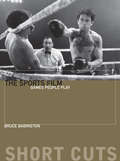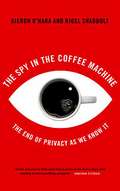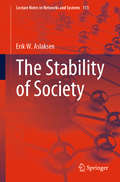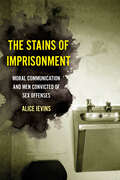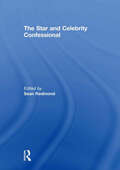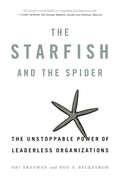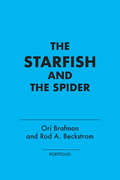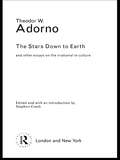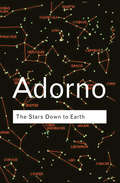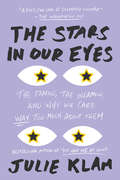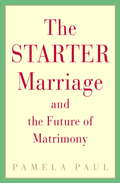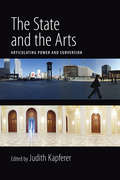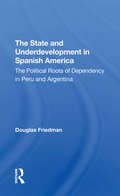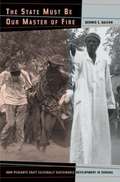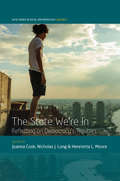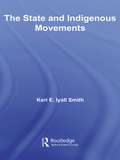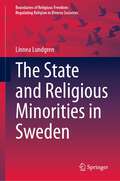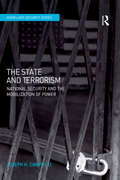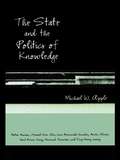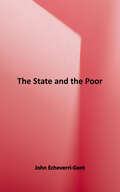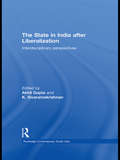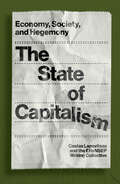- Table View
- List View
The Sports Film
by Bruce BabingtonAfter covering the genre's early history and theorizing its general characteristics, this volume then focuses on specific instances of sports films, such as the biopic, the sports history film, the documentary, the fan film, the boxing film, and explores issues such as gender, race, spectacle and silent comedy. Four major films are then closely analysed -- Chariots of Fire, Field of Dreams, the Indian cricket epic Lagaan, and Oliver Stone's Any Given Sunday. While recording American film's importance to the genre, the book resists the conventional over-concentration on American cinema and sports by its attention to other cinemas, for example the British, Indian, Australian, South Korean, Thai, German, New Zealand, Spanish, and so on, with the many different sports they depict.
The Sports Film: Games People Play (Short Cuts)
by Bruce BabingtonAfter covering the genre's early history and theorizing its general characteristics, this volume then focuses on specific instances of sports films, such as the biopic, the sports history film, the documentary, the fan film, the boxing film, and explores issues such as gender, race, spectacle and silent comedy. Four major films are then closely analysed – Chariots of Fire, Field of Dreams, the Indian cricket epic Lagaan, and Oliver Stone's Any Given Sunday. While recording American film's importance to the genre, the book resists the conventional over-concentration on American cinema and sports by its attention to other cinemas, for example the British, Indian, Australian, South Korean, Thai, German, New Zealand, Spanish, and so on, with the many different sports they depict.
The Spy In The Coffee Machine: The End of Privacy as We Know It
by Kieron O'Hara Nigel ShadboltWhat do you know about the new surveillance state that has been created in the wake of pervasive computing - that is, the increasing use of very small and simple computers in all sorts of host - from your computer to your coat? Well, these little computers can communicate via the web and form powerful networks whose emergent behaviour can be very complex, intelligent, and invasive. The question is: how much of an infringement on privacy are they? Could these intelligent networks be used by governments, criminals or terrorists to undermine privacy or commit crimes? From CCTVs to blogging, from cookies to RFID tags, we are sleepwalking into a new state of global hypersurveillance. And when even cans of Coke are connected to the internet, the risk of someone misusing this information is very high indeed. Kieron O'Hara is Senior Research Fellow in Electronics and Computer Science at the University of Southampton, UK. Nigel Shadbolt is Professor of Artificial Intelligence at the University of Southampton, UK, and was President of the British Computer Society in 2006-7.
The Stability of Society (Lecture Notes in Networks and Systems #113)
by Erik W. AslaksenIn this book, Erik W. Aslaksen builds on the view and model of society introduced in The Social Bond (Springer 2018), which portrays society as an information-processing system, and as both the result of the information and of the environment in which the information processing takes place. The processing power is provided by the individual, but is also greatly enhanced by the interaction between individuals, forming the collective intelligence that drives the evolution of society. In particular, this book focuses on the stability of that evolution, an issue that is of increasing concern given the current polarisation of the world society, both politically and economically, and the resultant interference in the operation of the collective intelligence. When we approach society as a genus and its evolution as a sequence of species, such as the family, clan, fiefdom, kingdom, and nation-state, the development of the next species – the world society – is now being thwarted by the desire of a minority to maintain a hegemonial position that resulted from a singularity in the process.
The Stag Hunt and the Evolution of Social Structure
by Brian SkyrmsBrian Skyrms' study of ideas of cooperation and collective action explores the implications of a prototypical story found in Rousseau's A Discourse on Inequality. It is therein that Rousseau contrasts the pay-off of hunting hare (where the risk of non-cooperation is small and the reward equally small) against the pay-off of hunting the stag (where maximum cooperation is required but the reward is much greater. ) Thus, rational agents are pulled in one direction by considerations of risk and in another by considerations of mutual benefit. Written with Skyrms' characteristic clarity and verve, The Stage Hunt will be eagerly sought by readers who enjoyed his earlier work Evolution of the Social Contract. Brian Skyrms, distinguished Professor of Logic and Philosophy of Science and Economics at the University of California at Irvine and director of its interdisciplinary program in history and philosophy of science, has published widely in the areas of inductive logic, decision theory, rational deliberation and causality. Seminal works include Evolution of the Social Contract (Cambridge, 1996), The Dynamics of Rational Deliberation (Harvard, 1990), Pragmatics and Empiricism (Yale, 1984), and Causal Necessity (Yale, 1980).
The Stains of Imprisonment: Moral Communication and Men Convicted of Sex Offenses (Gender and Justice #10)
by Alice IevinsA free open access ebook is available upon publication. Learn more at www.luminosoa.org. Recent decades have seen a widespread effort to imprison more people for sexual violence. The Stains of Imprisonment offers an ethnographic account of one of the worlds that this push has created: an English prison for men convicted of sex offenses. This book examines the ways in which prisons are morally communicative institutions, instilling in prisoners particular ideas about the offenses they have committed—ideas that carry implications for prisoners' moral character. Investigating the moral messages contained in the prosaic yet power-imbued processes that make up daily life in custody, Ievins finds that the prison she studied communicated a pervasive sense of disgust and shame, marking the men it held as permanently stained. Rather than promoting accountability, this message discouraged prisoners from engaging in serious moral reflection on the harms they had caused. Analyzing these effects, Ievins explores the role that imprisonment plays as a response to sexual harm, and the extent to which it takes us closer to and further from justice.
The Star and Celebrity Confessional
by Sean RedmondIn this book the different manifestations, meanings, and processes of the star and celebrity confessional will be explored. The confessional is taken to be any moment in which a star, celebrity, or fan engages in revelatory acts that are considered to be authentic, heart-felt, and honest. These confessional encounters can take place in an interview, through performance and presentation events, online, and in ‘unscripted’ encounters. A star may break down in tears, or reveal a previously unknown truth about their private life. However, this authenticity is often found to have been manufactured, or is timed to occur against a new release or product launch. Alternatively, the desire to confess may be seen to draw attention to the centrality of pseudo forms of emotion in contemporary culture and the obsessional behaviour it produces. In this book authors consider acts of confession by celebrities such as Tom Cruise, Michael Jackson, Jade Goody, Britney Spears, Sarah Jessica Parker, Tracey Emin, and Russell Crowe.
The Starfish and the Spider: The Unstoppable Power of Leaderless Organizations
by Ori Brafman Rod A. BeckstromIf you cut off a spider's head, it dies, but if you cut off a starfish's leg, it grows a new one, and that leg can grow into an entirely new starfish. Traditional top-down organizations are like spiders, but now starfish organizations are changing the face of business and the world.
The Starfish and the Spider: The Unstoppable Power of Leaderless Organizations
by Ori Brafman Rod A. BeckstromIf you cut off a spider's head, it dies. But if you cut off a starfish's leg, it grows a new one, and that leg can grow into an entirely new starfish. Traditional top-down organizations are like spiders, but now starfish organizations are changing the face of business and the world. What's the hidden power behind the success of Wikipedia, Craigslist, and Skype? What do eBay and General Electric have in common with the abolitionist and women's rights movements? What fundamental choice put General Motors and Toyota on vastly different paths? How could winning a Supreme Court case be the biggest mistake MGM could have made? After five years of ground-breaking research, Ori Brafman and Rod A. Beckstrom share some unexpected answers, gripping stories, and a tapestry of unlikely connections. THE STARFISH AND THE SPIDER argues that organizations fall into two categories: traditional "spiders," which have a rigid hierarchy and top-down leadership, and revolutionary "starfish," which rely on the power of peer relationships. It reveals how established companies and institutions, from IBM to Intuit to the U. S. government, are also learning how to incorporate starfish principles to achieve success. Find out: * How the Apaches fended off the powerful Spanish army for 200 years. * The power of a simple circle. * The importance of catalysts who have an uncanny ability to bring people together. * How the Internet has become a breeding ground for leaderless organizations. * How Alcoholics Anonymous has reached untold millions with only a shared ideology and without a leader.
The Stars Down to Earth (Routledge Classics)
by Theodor AdornoThe Stars Down to Earth shows us a stunningly prescient Adorno. Haunted by the ugly side of American culture industries he used the different angles provided by each of these three essays to showcase the dangers inherent in modern obsessions with consumption. He engages with some of his most enduring themes in this seminal collection, focussing on the irrational in mass culture - from astrology to new age cults, from anti-semitism to the power of neo-fascist propaganda. He points out that the modern state and market forces serve the interest of capital in its basic form. Stephan Crook's introduction grounds Adorno's arguments firmly in the present where extreme religious and political organizations are commonplace - so commonplace in fact that often we deem them unworthy of our attention. Half a century ago Theodore Adorno not only recognised the dangers, but proclaimed them loudly. We did not listen then. Maybe it is not too late to listen now.
The Stars Down to Earth (Routledge Classics)
by Theodor AdornoThe Stars Down to Earth shows us a stunningly prescient Adorno. Haunted by the ugly side of American culture industries he used the different angles provided by each of these three essays to showcase the dangers inherent in modern obsessions with consumption. He engages with some of his most enduring themes in this seminal collection, focusing on the irrational in mass culture - from astrology to new age cults, from anti-semitism to the power of neo-fascist propaganda. He points out that the modern state and market forces serve the interest of capital in its basic form. Stephan Crook's introduction grounds Adorno's arguments firmly in the present where extreme religious and political organizations are commonplace - so commonplace in fact that often we deem them unworthy of our attention. Half a century ago Theodore Adorno not only recognised the dangers, but proclaimed them loudly. We did not listen then. Maybe it is not too late to listen now.
The Stars in Our Eyes: The Famous, the Infamous, and Why We Care Way Too Much About Them
by Julie KlamFrom bestselling author Julie Klam comes a lively and engaging exploration of celebrity: why celebrities fascinate us, what it means to be famous today, and why celebrities are so important. “When I was young I was convinced celebrities could save me,” Julie Klam admits in The Stars in Our Eyes, her funny and personal exploration of fame and celebrity. As she did for subjects as wide-ranging as dogs, mothers, and friendship, Klam brings her infectious curiosity and crackling wit to the topic of celebrity. As she admits, “I’ve always been enamored with celebrities,” be they movie stars, baseball players, TV actors, and now Internet sensations. “They are the us we want to be.” Celebrities today have a global presence and can be, Klam writes, “some girl on Instagram who does nude yoga and has 3.5 million followers, a thirteen-year-old ‘viner,’ and a Korean rapper who posts his videos that are viewed millions of times.” In The Stars in Our Eyes, Klam examines this phenomenon. She delves deep into what makes someone a celebrity, explains why we care about celebrities more than ever, and uncovers the bargains they make with the public and the burdens they bear to sustain this status. The result is an engaging, astute, and eye-opening look into celebrity that reveals the truths about fame as it elucidates why it’s such an important part of life today.
The Starter Marriage and the Future of Matrimony
by Pamela PaulThe Starter Marriage and the Future of Matrimony is a pioneering study of first marriages lasting five years or less and ending without children, and of the changing face of matrimony in America. According to the brilliant trend analyst and journalist Pamela Paul, "It's easy to conclude that the starter marriage trend bodes ill for the state of marriage. After all, we're getting married, screwing it up, and divorcing--a practice that certainly isn't strengthening our sense of trust, family, or commitment. But though starter marriages seem like a grim prospect, there is also an upside. For one thing, if people are going to divorce, better to do so after a brief marriage in which no children suffer the consequences." But are there other consequences of starter marriages? And what causes these marriages to fail in the first place?In today's matrimania culture, weddings, marriage, and family are clearly goals to which most young Americans aspire. Why are today's twenty- and thirtysomethings--the first children-of-divorce generation--so eager to get married, and so prone to failure? Are Americans today destined to jump in and out of marriage? At a time when marriage at age twenty-five can mean a sixty-year active commitment, could "serial marriages" be the wave of the future? Drawing on more than sixty interviews with starter marriage veterans and on exhaustive re-search, Pamela Paul explores these questions, putting the issues into social and cultural perspective. She looks at the hopes and motivations of couples marrying today, and examines the conflict between our cultural conception of marriage and the society surrounding it. Most important, this lively and engaging narrative examines what the starter marriage trend means for the future of matrimony in this country--how and why we'll continue to marry in the twenty-first century.
The State And The Arts
by Judith KapfererJudith Kapferer and her collaborators present an insightful volume that interrogates relations between the state and the arts in diverse national and cultural settings. The authors critique the taken-for-granted assumption about the place of the arts in liberal or social democratic states and the role of the arts in supporting or opposing the ideological work of government and non-government institutions. This innovative volume explores the challenges posed by the state to the arts and by the arts to the state, focusing on several transformations of the interrelations between state and commercial arts policies in the current era. These ongoing challenges include the control of repressive tolerance, complicity with and resistance to state power, and the commoditization of the arts, including their accommodation to market and state apparatuses. While endeavouring to avoid the currently dominant pragmatic and didactic priorities of officialdom, the contributors tackle social and cultural policy and practice in the arts as well as connections between national states and dissenting art from a range of genres.
The State And Underdevelopment In Spanish America: The Political Roots Of Dependency In Peru And Argentina
by Douglas FriedmanChallenging the dependency theory approach to the origin of underdevelopment in Spanish America, this book argues that internal political and economic factors led the nations of the region to become dependent and underdeveloped during the nineteenth century. Dr. Friedman focuses on Peru and Argentina in the aftermath of their wars of independence to show how underdevelopment and dependency resulted from a crisis of the state brought about by the loss of legitimacy of Spanish colonial rule. Class conflicts had been effectively managed by the colonial state; its collapse, Dr. Friedman demonstrates, created conditions of intense inter- and intra-class conflicts, chiefly political in nature, which weak post-independence governments found impossible to restrain. Left with little authority, legitimacy, or control over internal resources, the fledging Peruvian and Argentine states turned to external sources for the capabilities with which to begin the process of consolidating their internal power. By the last half of the nineteenth century, both Peru and Argentina had chosen a course that led to their integration into the international economy as dependent nations.
The State Must Be Our Master of Fire: How Peasants Craft Culturally Sustainable Development in Senegal
by Dennis C. GalvanGalvan studies how peasants in rural Senegal creatively combine remembered elements of local culture into modern development efforts, thus generating innovative institutional blends that can render development more sustainable by meeting the needs of state-building without sacrificing community-based solidarity, local culture, and historic identity.
The State We're In: Reflecting on Democracy's Troubles (WYSE Series in Social Anthropology #3)
by Nicholas J. Long Joanna Cook Henrietta L. MooreWhat makes people lose faith in democratic statecraft? The question seems an urgent one. In the first decades of the twenty-first century, citizens across the world have grown increasingly disillusioned with what was once a cherished ideal. Setting out an original theoretical model that explores the relations between democracy, subjectivity and sociality, and exploring its relevance to countries ranging from Kenya to Peru, The State We're In is a must-read for all political theorists, scholars of democracy, and readers concerned for the future of the democratic ideal.
The State and Indigenous Movements (Indigenous Peoples and Politics)
by Keri E. Iyall SmithUsing the comparative historical method, this book looks at the experience of indigenous peoples, specifically the Native Hawaiians, showing how a nation can express culture and citizenship while seeking ways to attain greater sovereignty over territory, culture, and politics.
The State and Religious Minorities in Sweden (Boundaries of Religious Freedom: Regulating Religion in Diverse Societies)
by Linnea LundgrenThis book, a revised version of Lundgren’s PhD thesis, offers a deepened understanding of the changes in the governance of religious diversity and the complex relationship between state and religion. Linnea Lundgren explores how the narrative of risk and resource came to be by looking beyond the developments in the last few decades (particularly since 9/11) and analysing how the governance of religious diversity has developed over time. In particular, she focuses on the case of Sweden that is often regarded as one of the most secular countries in the world, while simultaneously being recognised as one of the most multi-religious countries in Europe due to a rise in immigration. This book reveals how the state has had a central role in setting the terms and conditions that both enable and limit what religious communities can do, thus shaping the function and role of religion in the public realm.Through the analysis of an extensive number of government documents over a period of seventy years (1952-2022), Lundgren challenges the idea that many of the recent controversies concerning religious diversity are new. She argues that many of the discussions held today regarding the accommodation of Muslims are decidedly similar to previous discussions regarding the management of Catholics and the Free Churches in the 1950s and 1960s. She shows that the underlying fear has remained the same; that the individual’s rights can become weakened or diminished in religious communities and that religious minorities will challenge the common shared values of the society. In light of this Lundgren concludes that in order to understand what is really at stake in the debate regarding religious diversity in Sweden today, there is a need to look at underlying tensions that exist between the state, civil society and the individual, a relationship that differs considerably in the Nordic context compared to other contexts. This text appeals to students and researchers working in the sociology of religion and people who work with governance of religion, religion and civil society, and religion and law in Europe.
The State and Terrorism: National Security and the Mobilization of Power (Homeland Security)
by Joseph H. IiAdopting an innovative approach to the ongoing debate over homeland security and state response to terrorism, Joseph Campos investigates the contextualizing of national security discourse and its management of terrorism. New ideas developed in this book reflect ways in which national security is mobilized through specific discourse to manage threats. In addition, a review of presidential rhetoric over the last 30 years reveals that national security discourse has maintained an ideological hegemony to determine what constitutes violence and appropriate responses. The volume incorporates historical depth and critical theory in a comparative framework to provide an invaluable insight into how national security is developed and how it works with the concept of terrorism to secure the state.
The State and the Politics of Knowledge
by Michael W. AppleThe State and the Politics of Knowledge extends the insightful arguments Michael Apple provided in Educating the "Right" Way in new and truly international directions. Arguing that schooling is, by definition, political, Apple and his co-authors move beyond a critical analysis to describe numerous ways of interrupting dominance and creating truly democratic and realistic alternatives to the ways markets, standards, testing, and a limited vision of religion are now being pressed into schools.
The State and the Poor: Public Policy and Political Development in India and the United States
by John Echeverri-GentThis comparison of rural development in India and the United States develops important departures from economic and historical institutionalism. It elaborates a new conceptual framework for analyzing state-society relations beginning from the premise that policy implementation, as the site of tangible exchanges between state and society, provides strategic interaction among self-interested individuals, social groups, and bureaucracies. It demonstrates how this interaction can be harnessed to enhance the effectiveness of public policy. <p><p>Echeverri-Gent's application of this framework to poverty alleviation programs generates provocative insights about the ways in which institutions and social structure constrain policy-makers. In the process, he illuminates new implications for the concepts of state autonomy and state capacity. The book's original conceptual framework and intriguing findings will interest scholars of South Asia and American politics, social theorists, and policy-makers.
The State and the Private Sector in Latin America
by Mauricio FontThis book follows ten political economic histories since the 1970s, showing how different forms of partnership have developed, flourished or declined over the time. The author's argument is supported by rich empirical material. It places partnership schemes in a broader social context and provides a deep insight into the phenomenon.
The State in India after Liberalization: Interdisciplinary Perspectives (Routledge Contemporary South Asia Series)
by Akhil GuptaThis book assesses the impact of liberalization on practices of government and relations between state and society. It is clear that liberalization as state policy has complex forms of regulation and deregulation inbuilt, and these policies have resulted in dramatic increases in productivity and economic wealth but also generated spectacular new forms of inequality between social groups, regions, and sectors. Through a detailed examination of the Indian state, the contributors - all experts in their respective fields - explore questions such as: Have the new inequalities resulted in greater social unrest and violence? How has the meaning of citizenship changed? What will the long-term effects of regional economic imbalances be on migration, employment, and social welfare? Will increasing federalism result in new problems? Will smaller governments be more effective in providing basic necessities such as clothing, housing, food, water, and sanitation to citizens? What does liberalization mean to Indians in cities and villages, in small towns, and metropolises, in poor, middle class, or wealthy homes? Are concepts like social capital, decentralization, private enterprise, and grass-roots globalization effective in analyzing the post-liberalization state, or are new concepts needed? By focusing on what specifically has changed about the state after liberalization in India, this volume will shed light on comparative questions about the process of neoliberal restructuring across the world. As such, it will be of interest to scholars of a variety of disciplines, including sociology, anthropology, political science, geography, international studies, public policy, environmental studies and economics.
The State of Capitalism: Economy, Society, and Hegemony
by Costas Lapavitsas EReNSEP Writing CollectiveThinking beyond pandemic capitalismThe health emergency that broke out in 2020 is a landmark event in the development of capitalism, confirming the underlying change signalled by the Great Crisis of 2007-9. The pandemic has catapulted the state to the centre of economic activity. However, a historic impasse is steadily becoming apparent at the core of the world economyProductive accumulation is flaccid, as both profitability and labour productivity are weak. Financialisation has entered a new phase, as &“shadow banking&” grew relative to other banks but is entirely dependent on the state. The power of the state derives from command over fiat money and can certainly deliver enormous boosts to aggregate demand, but that is not enough to tackle the weakness of the productive sector.The rise in inflation for the first time in forty years indicates the impasse. There is a transparent need for intervention on the supply side, directly challenging capitalist property rights. There is no evidence, however, that the ruling blocs in core countries would engage in such policies.The pandemic crisis also brought to the fore fresh divisions of core and periphery across the world economy. Imperialism has assumed new forms, spurred by globally active financial capital and internationalised productive capital. A renewed contest for hegemony has emerged as US power declined. The economic challenge of China will unfold steadily in the years ahead, intensifying political tensions and military rivalries.This book is the work of a research collective comprising authors from several parts of the world. It analyses these vital issues from the perspective of Marxist political economy and puts forth alternative anticapitalist proposals.
